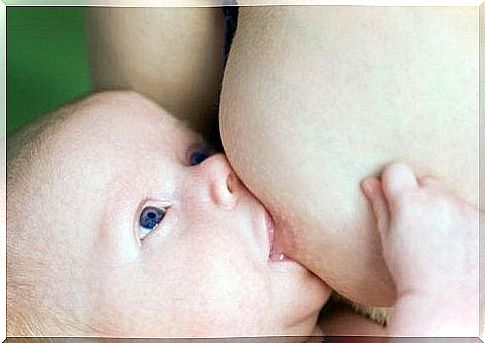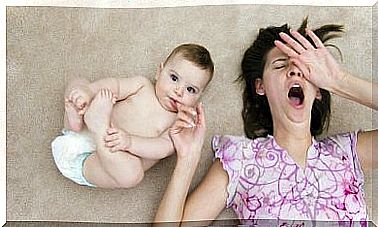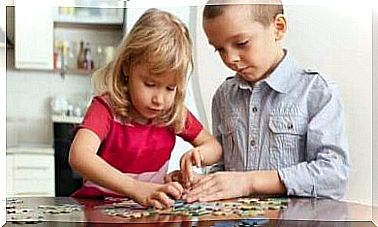The First Days With The Baby At Home

After nine months of waiting, you hold your baby in your arms. However, you will be gripped by doubts and a certain fear of the changes that will result. However, the best thing about the first few days with the baby at home is to stay calm and enjoy this unique and special moment.
Although you’ve heard that the newborn just eats and sleeps, this first step to motherhood is not easy: you have to meet the child’s needs while you are tired and your body is still recovering from birth. The solution is to not get overwhelmed and to ask for help to take advantage of your baby’s sleep times.
The first few days with the baby at home turn the whole family upside down, as you first have to find your routine. However, it is advisable to face this situation calmly and without fear. How are these new days and how do we deal with the new family member?
The first few days at home with the baby: the adjustment begins
Although first mothers are very concerned about the first few days with the baby at home, it shouldn’t be a cause for panic. It is important to address the behavior of the newborn, which has to adapt to the “outer” life: oxygen supply and nutrition do not come through the umbilical cord and the protection of the uterus disappears.
Just relax! Not only do you have the help of relatives and medical staff, but every mother has the best weapons to handle this moment: instinct, affection, and maternal common sense. In the following we give you important tips for this moment.
Feed the baby
The newborn has a tiny stomach, so it feeds on tiny portions and drinks very often for it. Many of them will crave the mother’s breast or her precious bottle every two or three hours, while others will feel hungry more often.
When your baby is in your arms it will be very easy to tell if he is hungry as he will start whining which will turn into screaming or crying. In addition, there are more subtle signs such as sucking on the hands, sucking movements of the mouth, or turning the head towards the chest.
Normal? Hiccups, belching, and vomiting
Some babies have to be helped to make their burrows, others do it all by themselves and almost without help. To know which group your baby belongs to, all you have to do is watch them closely after meals: if the baby is restless or irritable, it probably needs to release the air it swallowed.
Also, you shouldn’t be afraid if your child has hiccups or vomits; it is normal and does not cause him any discomfort. Also, don’t be alarmed if the little worms vomit or spit milk during or after each meal.
However, if the child is vomiting excessively and arching their backs or crying at the same time (especially at night), consideration should be given to reflux, which is common in newborns and improves as the baby gains control of the head muscles.

On the subject of diapers
A wet diaper can be very annoying and even cause dermatitis. If the baby drinks breast milk, he will wet the diaper up to five times a day, and if he drinks infant formula, then even more often – up to 10 times a day.
However, breastfed babies tend to have more bowel movements than those who drink infant formula due to the time it takes to digest each milk. So write down the frequency in case the doctor asks about it.
While the child’s first bowel movements are black and consistent (“meconium”), the baby’s diaper for the first few days at home may be greenish-brown or mustard-colored and lumpy when breastfeeding, or mushy and more colored when fed with infant formula is fed.
And the crying?
Your baby will cry and that is impossible to avoid or prevent because it is the way to express their discomfort or unmet needs. You will find that the baby is rather calm and sleepy for the first few days at home.
However, a few weeks later, the newborn will cry an average of two hours a day. The good news is that over time you will learn why your child is crying and what they need.
But if this is all new to you, you can check to see if the baby is crying from a full diaper, hunger, fatigue, or discomfort. If these factors did not cause the crying, the baby may have been exposed to excess stimuli.
The controversial sleep of the newborn …
During the first few days with the baby at home, they will not sleep very much as they wake up frequently to drink. On average, however, your little one will rest about 16 to 18 hours a day.

In the car seat, the bassinet, the sling or in the arms: Most babies feel more comfortable in places that are small and that enclose them like in the uterus. Newborns love to be wrapped in blankets that mimic their natural environment for the past 9 months and avoid bumps and reflex movements.
Bathing
Surely you have been told that the baby can be bathed the first time the umbilical cord falls off. In the first few days at home, however, you can also gently clean it with the sponge. You can also use a damp cloth to keep the folds of skin on your body clean.
Clean the diaper area with petroleum jelly or cream, which should dry out and relieve rashes and irritation (diaper rash). Don’t worry about what is called the “milk crust” or dryness of the baby’s skin.
It is important to pay attention to the newborn’s umbilical stump, which must be cleaned every time the diaper is changed. The baby’s navel should be covered with a sterile gauze, but it is necessary to control its appearance and keep it dry and clean.
Changes in your body
Your body will undergo major changes after the birth: with the arrival of your child, you will begin to produce milk after a liquid that is rich in antibodies and called “colostrum”, yellower than breast milk, appears. Your breasts will feel fuller, firmer, and heavier.
Breastfeeding is not only about feeding the child, it also connects you in a unique way with the life that comes out of you. However, difficulties arise at the time of breastfeeding for the first few days with the baby at home. Although it isn’t easy, you will have to get the baby to suckle both breasts.
A separate chapter deserves the care of the nipples in the first days of motherhood, because breastfeeding creates a lot of pain and tenderness in the area that can also become sore. To relieve this pain, apply marigold ointment or use your own milk to moisturize the nipples.









